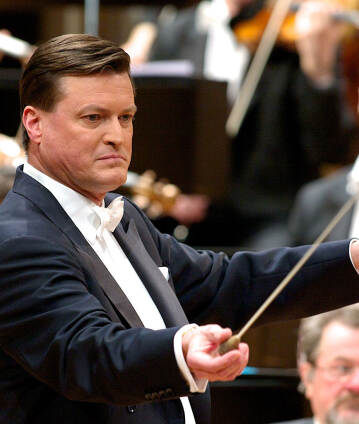Christian Thielemann conducts Beethoven’s “Eroica”

The history of the symphony entered a new phase with Beethoven’s “Eroica”. The symphony was no longer just playing with themes and instruments, but rather dedicated to an idea – the idea of the heroic, which lends the work an incomparable dynamism. In addition to the symphony, conductor Christian Thielemann presents works by Franz Liszt and Hans Werner Henze.
These are orchestral works that refer to literary or mythological figures in completely different ways: on the one hand, Hans Werner Henze’s orchestral piece Sebastian im Traum, which premiered in 2005 and is based on a poem by Georg Trakl. As the composer himself notes, his music tries to “follow the traces of the poet’s words (as someone with a movie camera tries to capture the course of events or as another perhaps takes down the communication of subject matter in shorthand)”. The piece, to which Henze gave the subtitle Salzburg Night Music, is full of allusions “to the rustic Baroque, to the biblical, to the wooden crucifix, to the nearness of death, to the moonlight, to Traklish evening sonatas”.
This concert also includes two works that refer to the legends of the ancient world: Franz Liszt’s symphonic poem Orpheus, composed precisely 150 years before Henze’s composition, and Ludwig van Beethoven’s Eroica, bearing witness to the composer’s grappling with a symbolic figure of the European enlightenment: Prometheus. It was no coincidence that Beethoven based the finale of his Third Symphony, originally titled “Bonaparte”, on a melody from his ballet music The Creatures of Prometheus, which premiered in 1801: for – as Johann Wolfgang von Goethe later remarked – Napoleon also brought to mankind “light: a moral enlightenment.”
© 2015 Berlin Phil Media GmbH
Related interviews
Artists
Our recommendations
- Christian Thielemann and Albrecht Mayer with works by Strauss and Bruckner
- Christian Thielemann conducts Brahms’s “Deutsches Requiem”
- Chopin’s Piano Concerto No. 1 with Maurizio Pollini and Christian Thielemann
- Christian Thielemann conducts Bruckner’s Eighth Symphony
- Christian Thielemann and Gidon Kremer
- A Strauss evening with Christian Thielemann and Anja Kampe